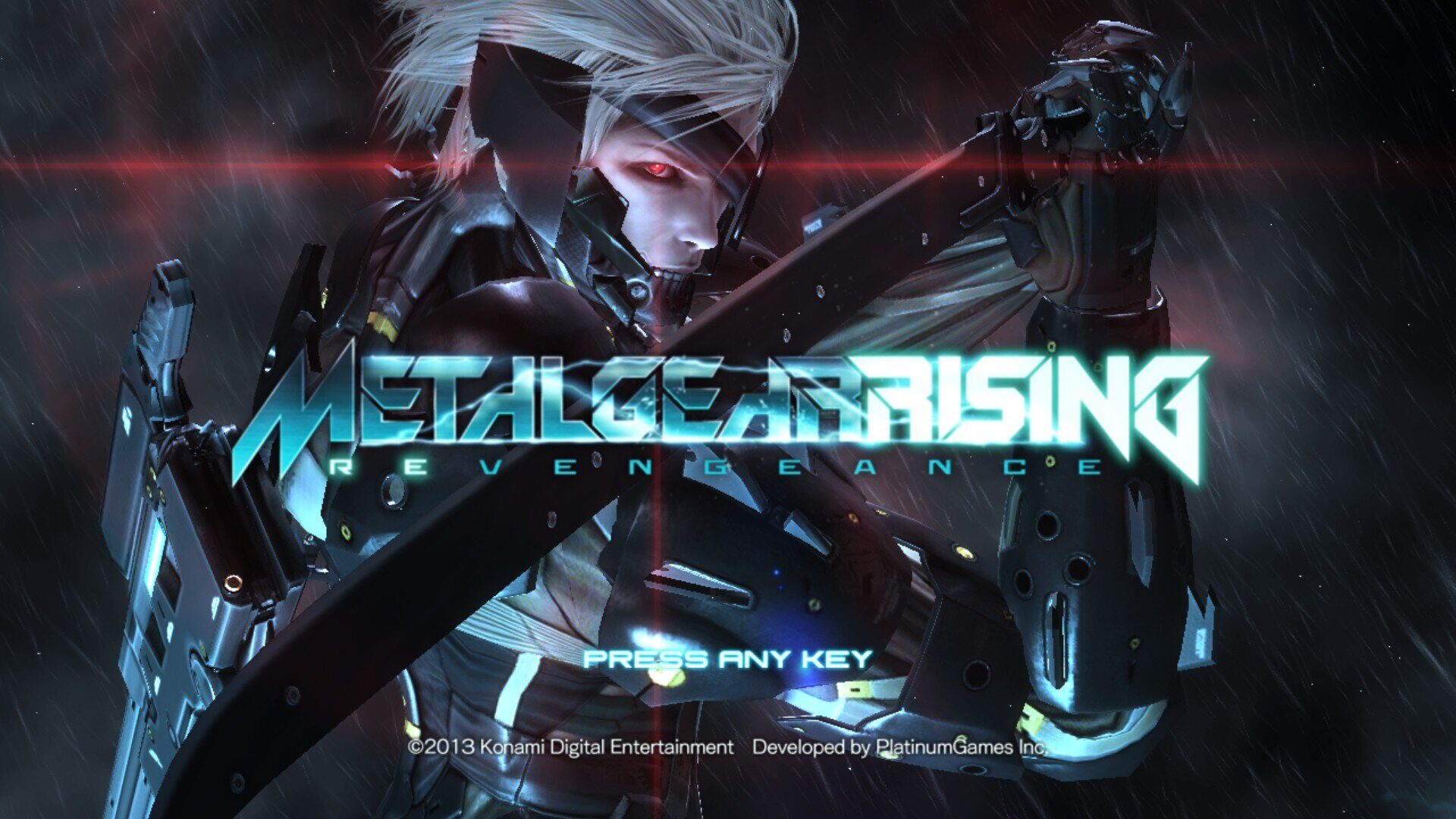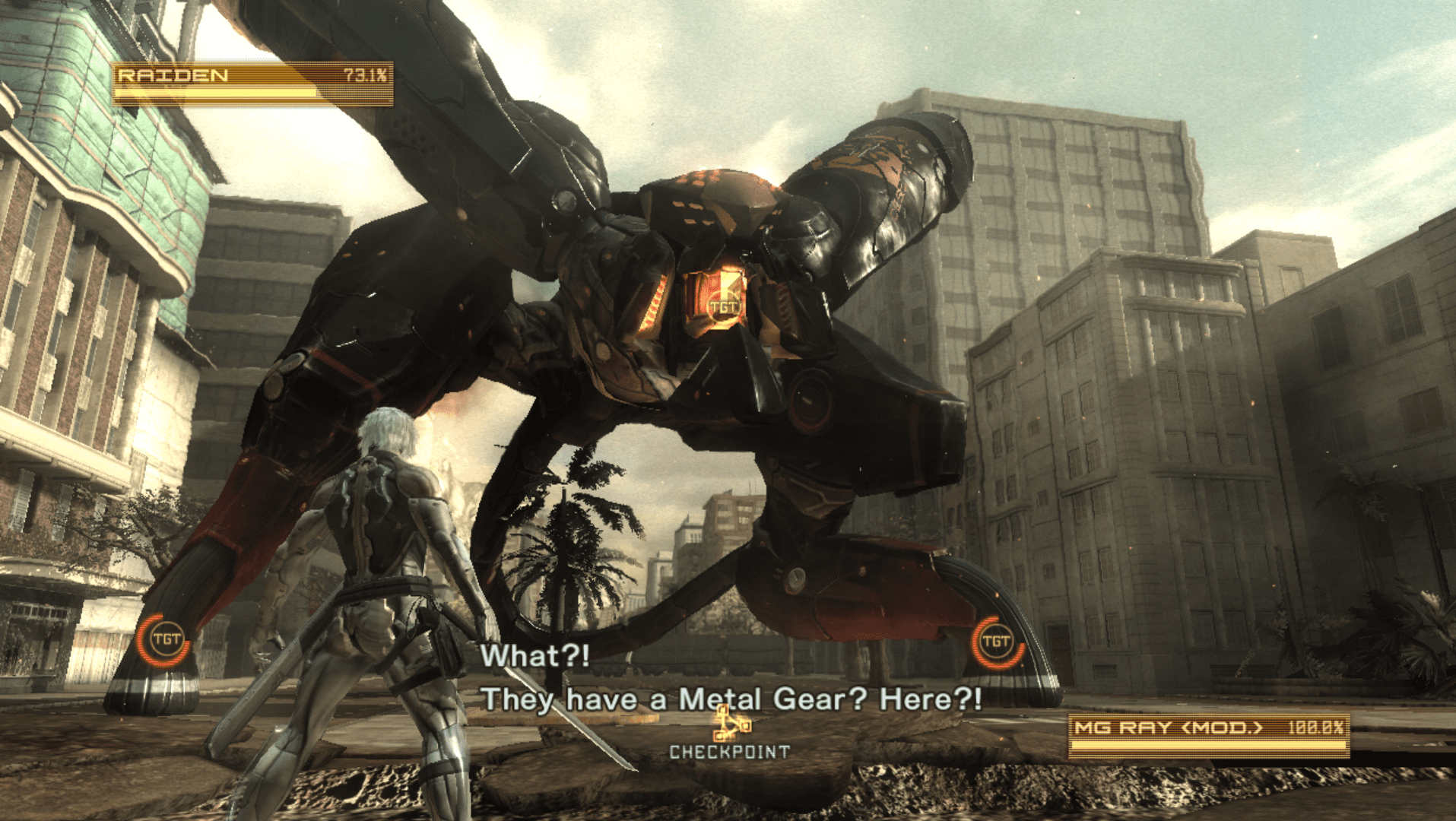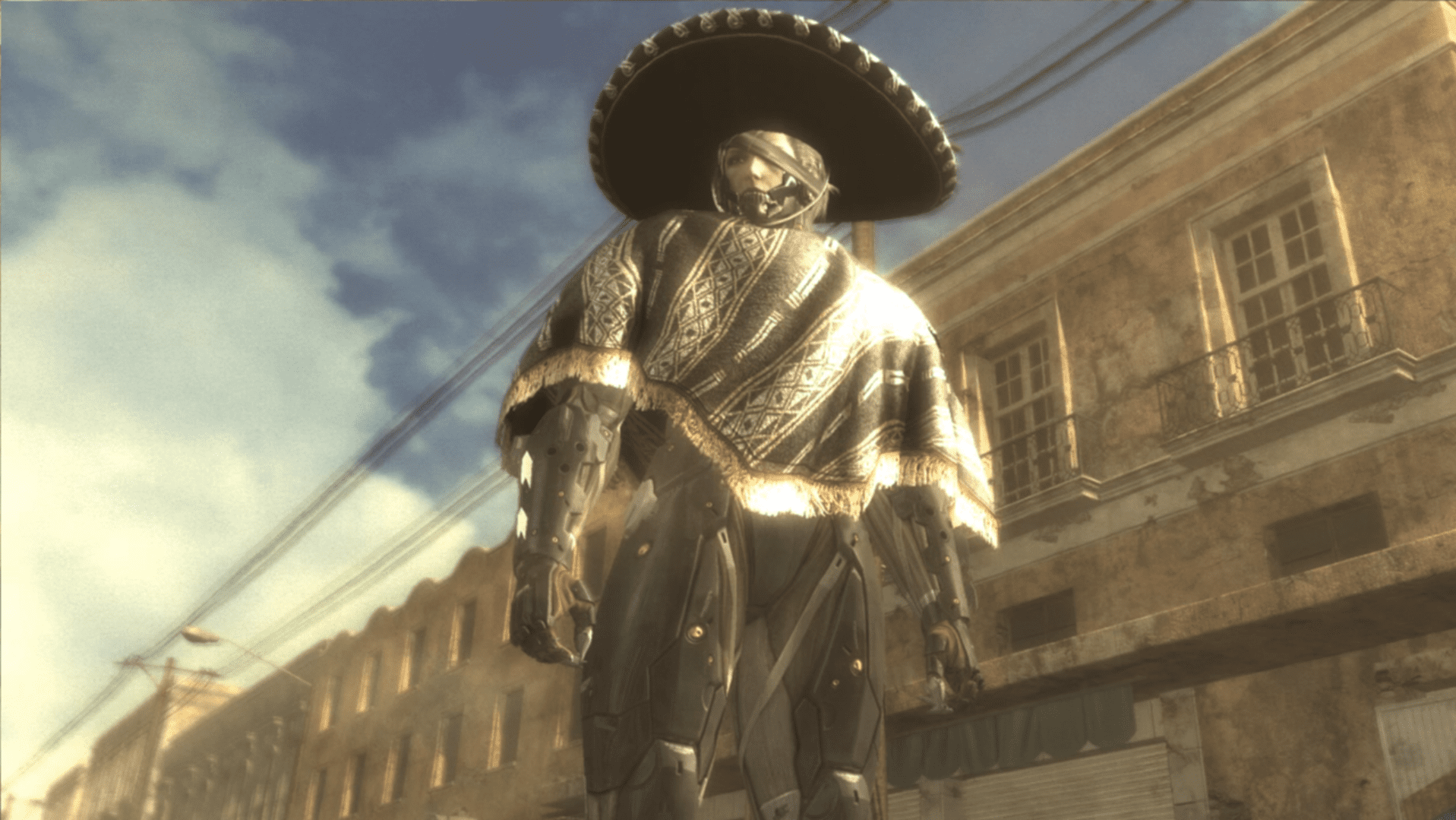(WARNING: The following review includes descriptions of graphic material. Reader discretion is advised.)

The Metal Gear franchise is quite possibly the most polarizing series in all of video games. The original top down stealth games from the late 1980s and early 1990s remain in relative obscurity, overshadowed by the cinematic action of Metal Gear Solid and its sequels that took the world by storm in the late 90s and throughout the 2000s. Many have praised these games as visionary masterpieces, but just as many have criticized them as pretentious hack-jobs. I haven’t played most of the games personally, but I have picked up a fair bit of second hand knowledge perusing gaming forums, wikis, and crossovers like Super Smash Bros. over the years.
Recently a spin-off of Metal Gear Solid from 2013 entitled Metal Gear Rising: Revengeance gained a fair bit of traction thanks to a surge of internet memes. Since it is one of the few Metal Gear games readily accessible on PC via Steam combined with the fact that it was made by renowned action game studio Platinum Games I can at least understand why this game might start making waves 9 years later, but does it deserve all this attention? Hold onto your butts because you’re about to find out.
Before I dive into the game proper however, there is a bit of history to its development that I think is important to understanding the end product. Originally Metal Gear Rising was being developed in-house by Metal Gear publisher Konami as a prequel to Metal Gear Solid 4 that would tell the story of how Metal Gear Solid 2 protagonist Raiden became a cyborg ninja (no that is not a joke) while also experimenting with a brand new physics engine. However, development wasn’t working out the way they hoped and Konami quietly scrapped the project and exported development to Platinum Games where it would undergo a drastic change in direction. Needless to say after such a troubled development it’s a wonder they managed to ship the game at all, but to be brutally honest it probably would have been better if they didn’t.
Firstly I’d like to take a moment to apologize to the gameplay of Yakuza Kiwami as in my review of that game I wrote: “While there is some depth to be had here, it’s not on the level of other action games like Devil May Cry or literally anything Platinum Games has ever made.” Having now played Metal Gear Rising I can safely say “literally anything Platinum Games has ever made” was far too broad a statement because I think Yakuza Kiwami had better action than this game. MGR’s combat is very limited with only a handful of basic combos and a handful of upgrades that only marginally expand your options. Furthermore, the controls are extremely unintuitive with too many actions stacked on top of the same 3 buttons. It genuinely baffles me that this game doesn’t use all four face buttons in combat. Above all of this the biggest offense made with the core gameplay is the camera which is extremely squirrelly, constantly focusing on the wrong directions causing me to take damage from attacks I couldn’t see.
To make matters worse, the game also has lots of tacked on features that further harm the game. The freeform cutting mechanic allows the player to swing their sword in any direction and slice up enemies and objects with extreme precision, no doubt a remnant of that experimental physics engine in the original version. Bafflingly this mechanic is tied to an analog stick which feels incredibly unnatural and something I never got used to using by the end of the game. There’s also the “ninja run” which lets players parkour their way past obstacles with ease. The problem is it really boils down to just holding the button while moving forward, making it more like turning on autopilot rather than pulling off acrobatic stunts.
And of course because this is a Metal Gear game there has to be some stealth implemented in there somewhere. Unlike the old Metal Gear games (and the Metal Gear Solid games to a lesser extent) which were designed with stealth as your first approach, the stealth approach in Metal Gear Rising rarely ever works with enemies able to spot you from the other side of the room even if you’re trying to sneak past slowly under the series staple cardboard box. The final nail in the coffin is the game’s length which is only about 7 hours long with extra “VR Missions” that can be unlocked by hacking computers hidden throughout the main story and it’s far too short for a game that’s currently being sold for $30 at base price.

Nothing says overcompensating like a first boss the size of a building.
By now you’re probably wondering if there’s anything good to say about this game. Well, the music was easily the best part of the experience with a hard rock edge that compliments the fast paced action really well. Many songs even have dynamic lyrics which only play during the most climatic sequences of a fight. I also thought the boss enemies had cool designs, but they’re dragged down by the rest of the game’s generic enemies and lackluster environments. There’s also multiple difficulty settings that can extend the game’s replay value as well, but at that point I’m just stretching for something positive to say. If Platinum had cut out all these tacked on extra mechanics and refined the core gameplay it almost certainly would have been a better game, but considering they were working with the unfinished scraps of another project there may not have been enough time to iron things out before the deadline.
I’ve mostly been focusing on the gameplay up until this point, but no review of Metal Gear is complete without an examination of its story. After all, it is the most discussed and debated aspect of the franchise. Somebody get a coffin ready for me because I’m about to unleash the wrath of Metal Gear loyalists and there’s no guarantee I’m coming back alive. Metal Gear Rising’s story isn’t just bad, it’s broken at a foundational level.
In the jump from the original development team at Konami to Platinum Games the decision was made to set the story after the events of Metal Gear Solid 4 so the new team would have more creative freedom without contradicting the established storyline. I would say this was a pretty good decision, but they still decided to use the character Raiden as the game’s protagonist which ends up contradicting the established storyline anyway. Raiden was introduced in Metal Gear Solid 2 as an ex-child soldier turned special forces operative being manipulated by a shadowy conspiracy known as The Patriots to turn him into a soldier that can rival the legendary series protagonist Solid Snake. By the time of Metal Gear Solid 4 The Patriots turned Raiden into a cyborg, further stripping the man of his humanity in pursuit of the ultimate living weapon. It’s a very over-the-top and melodramatic story, but by the end of MGS4 he helps take down The Patriots once and for all, has his superhuman cybernetics removed, and vows to live the rest of his life in peace with his family, which is a fitting ending all things considered.
Unfortunately, Metal Gear Rising drags Raiden back onto the battlefield, undermining his entire character arc in one fell swoop which is bad enough as is, but as the game progresses he continues to slaughter dozens of men by chopping them to bits with his sword and pulling out their spines (yes it’s that graphic). He ultimately abandons any and all pretenses of being a hero or fighting for justice and becomes a psychopathic monster. This is complete and utter character assassination and for a series that supposedly prides itself on storytelling it is absolutely unacceptable. I already wasn’t really having the greatest time in the world struggling against the awful controls of a mediocre combat system, but when Raiden turned full-on super villain I genuinely considered quitting the game.
Outside of the protagonist’s horrific characterization, nothing else about the story is much better, sometimes it’s arguably even worse believe it or not. The plot is mostly about stopping a Private Military Company called Desperado from dragging America into a new war that would reignite the wartime economy in which PMCs thrive. The agents of Desperado are cartoonishly evil antagonists who mostly just spew a bunch of nonsense, telling Raiden that they’re not so different from one another and celebrating the coming war with classic lines such as “like the good old days after 9/11!” This is real dialogue in the game and I hate it as much as you do. This game thinks it’s being deep and insightful by saying “we’re all just different shades of bad” and “war profiteering is evil,” but in reality it’s all skin deep with no real perspective to add to any serious discussion of these topics.

STEALTH.
From the Catholic perspective there’s honestly not much, if anything, to take away from Metal Gear Rising: Revengeance between all the needless hyper violence and morally bankrupt storytelling. As I said before, I was considering quitting the game after Raiden’s heel turn and I probably would have followed that instinct if I wasn’t planning on reviewing the game for this website. If there is any wisdom to impart from this experience it’s that we should always be wary of the sunk cost fallacy, don’t let the amount of time and money you’ve spent on a game stop you from putting it down if it’s making you feel miserable.
Even divorced from any question of intellectual, moral, or spiritual edification I wouldn’t recommend Metal Gear Rising: Revengeance to anyone on the simple fact that it’s just not very good. The gameplay isn’t up to par with Platinum Games’s other titles and the story is unbearably atrocious. Don’t let all the hype fool you, Revengeance is an unfulfilling path best left untraveled.
Scoring: 44%
Gameplay: 2/5
Visuals: 2/5
Sound: 4/5
Story: 1/5
Replayability: 2/5
Morality and Parental Warnings: Metal Gear Rising: Revengeance is an intense action game where the player destroys cyborg soldiers and killer robots using a sword and other weapons. The violence is extremely graphic with large amounts of blood and dismemberment. Strong language is frequent in the game’s dialogue. Some dialogue exchanges include nihilistic philosophy with one instance being explicitly anti-religious. The story also promotes a very utilitarian worldview, suggesting ends justify the means. There are instances of human trafficking, child soldiers, and human experimentation. References to real world events and politics are poorly handled with little context or substance presented. Some characters wear form fitting uniforms.
